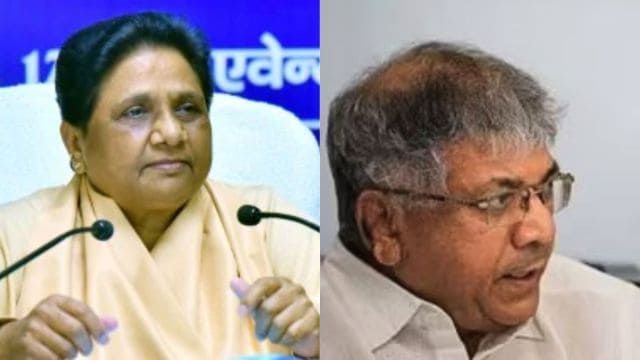
It is practically a ritual now for political pundits to write obituaries of “Dalit politics” after every big election. This time too, the dismal performance of the Bahujan Samaj Party (BSP) in Uttar Pradesh and Vanchit Bahujan Aghadi (VBA) in Maharashtra have allowed many political analysts to do so once again. While the BSP and VBA have indeed performed poorly, the success of the Lok Janshakti Party (LJP) in Bihar and Viduthalai Chiruthaigal Katchi (VCK)in Tamil Nadu offered alternative models for Dalit politics.
The BSP and VBA are the proponents of independent Dalit politics whereas the LJP and VCK allied with the dominant national alliances. In the 2024 general elections, INDIA and NDA blocs have created great political contestation and forced major political parties to take sides. Under such pressure, independent contests by the BSP and VBA are either seen as insignificant players or relegated to being the “B team” of the BJP. Such analyses also suggest that Dalit political movements will survive only if they shed their uncompromising attitude and join dominant alliances.
The Idea of Independent Dalit Politics
Babasaheb Ambedkar thought that modern political democracy would not re-establish the power and privileges of conventional social elites. Rather, it would allow socially marginalised groups to take centre stage in transforming the structures of power. He expected that independent India’s new polity would allow the Dalits to emerge as robust leaders of marginalised social groups and challenge the domination of the social elites over political power. Though Ambedkar’s last party, the Republican Party of India, failed to live up to his expectations, the arrival of BSP in the mid-1980s initiated a dynamic shift.
The BSP has groomed a robust Dalit political consciousness and inspired the community, acting as an independent articulator of their concerns. Such assertive gestures have democratised the political power substantively and invited the Dalits to join the polity as key players. Under Mayawati’s leadership, the BSP emerged as a popular party and governed the state on five occasions. However, in recent years, the BSP has been inactive during crucial political events and failed to escape the caste stereotypes that have relegated it to being largely a Dalit party. Today, the possibility that marginalised social groups (including Muslims) will be mobilised by the BSP, appears a distant dream.
On the other hand, the VBA led by Prakash Ambedkar went beyond the conventional image of the Dalit party and engaged with the non-Dalit social groups to build a “Vanchit-Bahujan” political platform. In the 2019 elections, it often took radical political positions against right-wing politics and emerged as a respectable political alternative for marginalised social groups. However, in 2024, VBA’s decision to not join the INDIA bloc and contest the elections independently did not go down well with Maharashtra’s Dalit-Bahujan groups.
Decline of independent Dalit politics
In the current Lok Sabha, the BSP’s vote share has come down to 9. 39 per cent, down from 2014 (19.77 per cent) and 2019 (19.42 per cent). While it did not win any seats, the party received more votes than the winning margin of NDA candidates in 16 seats. Similarly, the VBA’s vote share in the last Lok Sabha election was an impressive 8 per cent, which has come down to a mere 2 per cent this time. VBA’s leader, Prakash Ambedkar, received around three lakh votes in Akola but stood third in the race. Only two VBA candidates (Utkarsha Rupwate in Shirdi and Vasant Magar in Buldhana) received respectable votes while two others (in Hathkangle and Mumbai North West seats) received votes more than the winning margin.
Dalit Parties in National Alliances
Distinct from the BSP and the VBA, parties like the VCK in Tamil Nadu and LJP (led by Chirag Paswan) have joined the dominant national alliances. The LJP is part of the NDA and has won five seats, whereas the VCK is part of the INDIA bloc and has won two seats. Both parties in the past have raised the issues of social justice, provided an impressive podium to Dalit voices and argued for equitable participation of marginalised social groups in political institutions. However, these parties are overtly dependent upon the bigger political players for electoral success and have little capacity to challenge the conventional ruling elites.
In the run-up to the 2024 general elections, the issues of social justice were highlighted by both INDIA and NDA. The BSP and VBA in turn have often argued that these alliances hardly have offered dignified space to the Dalit parties. By becoming part of the national alliance, Dalit parties diverge from their commitment towards the welfare of marginalised social groups. The VBA has further argued that these blocs often belittle the social justice agenda and cannot be trusted. However, both models appear to be ineffective in the current context.
The way forward
For the revival of the Dalit politics intellectual and visionary leadership is needed to challenge the current passivity and dependency. The diverse Dalit political movements need to ponder organising a unified political bloc, an alliance of all Dalit parties at the national level. It is further required that various stakeholders, intellectuals and civil society activists also engage with and deliberate on the possibility of a federal Dalit front, reimagining a robust agenda for Dalit emancipation and building a movement for radical political transformation. Such an alliance will further help the segmented Dalit movement to come up with a new manifesto for social justice.
The writer is assistant professor, Centre for Political Studies, JNU
Click here for real-time updates on the Lok Sabha Election Results 2024


